Analysis of Crisis in WTO: Goods, Dispute Settlement, Climate Change
VerifiedAdded on 2022/08/21
|10
|2051
|9
Essay
AI Summary
This essay examines the multifaceted crisis currently facing the World Trade Organization (WTO). It delves into the impact of climate change on global trade, particularly concerning goods and services, and explores the increasing number of trade disputes among member nations. The study analyzes how the transition from goods to services trade is influencing the WTO's functions and stability. The research incorporates quantitative and qualitative data, including graphs and statistical tables, to illustrate the effects of climate change and trade conflicts. It also assesses the effectiveness of WTO policies and dispute settlement mechanisms in addressing these challenges, including the US-China trade conflict and disputes over renewable energy subsidies. The essay concludes by highlighting the critical areas requiring prompt action to stabilize world trade and maintain the WTO's relevance.
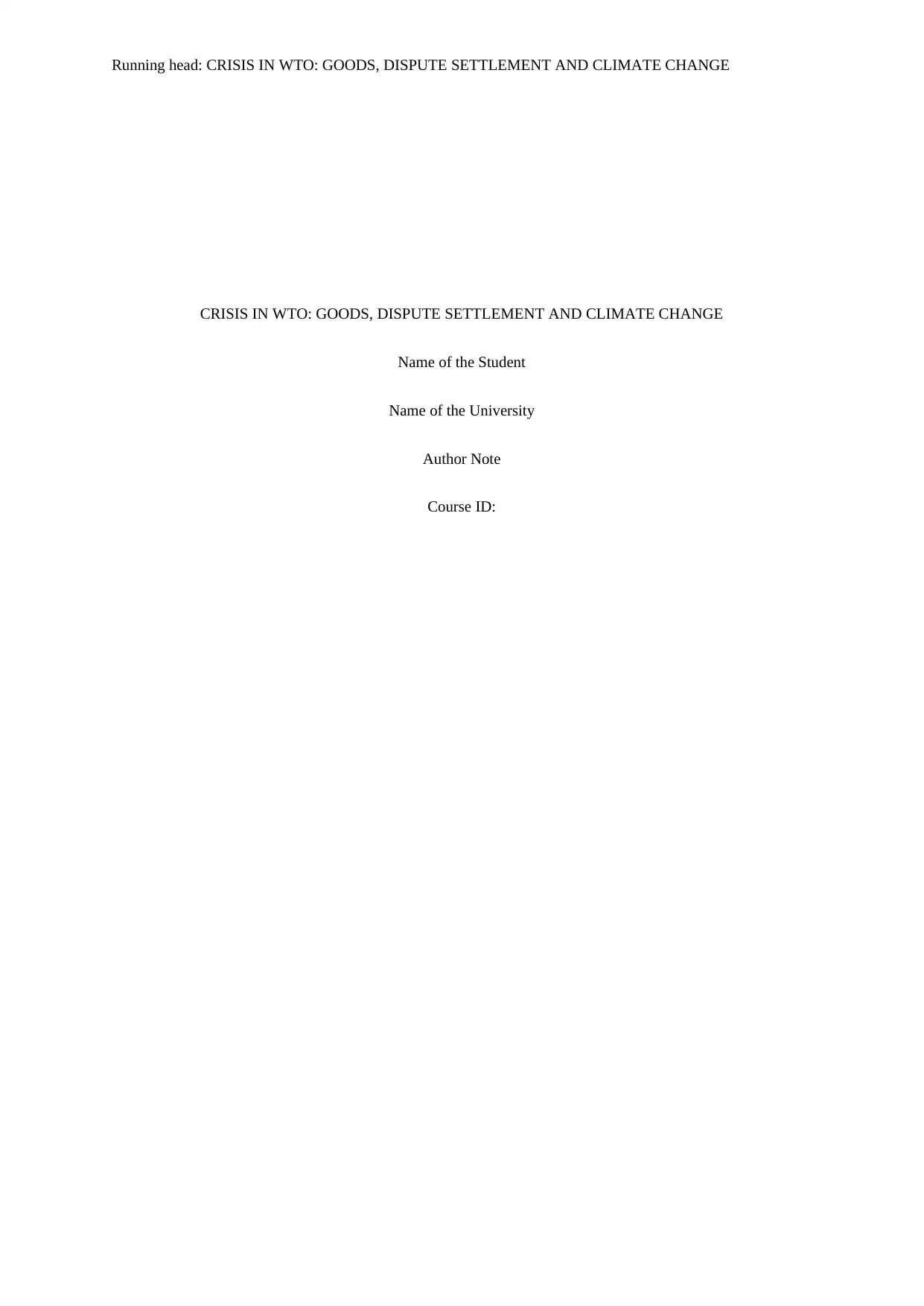
Running head: CRISIS IN WTO: GOODS, DISPUTE SETTLEMENT AND CLIMATE CHANGE
CRISIS IN WTO: GOODS, DISPUTE SETTLEMENT AND CLIMATE CHANGE
Name of the Student
Name of the University
Author Note
Course ID:
CRISIS IN WTO: GOODS, DISPUTE SETTLEMENT AND CLIMATE CHANGE
Name of the Student
Name of the University
Author Note
Course ID:
Paraphrase This Document
Need a fresh take? Get an instant paraphrase of this document with our AI Paraphraser
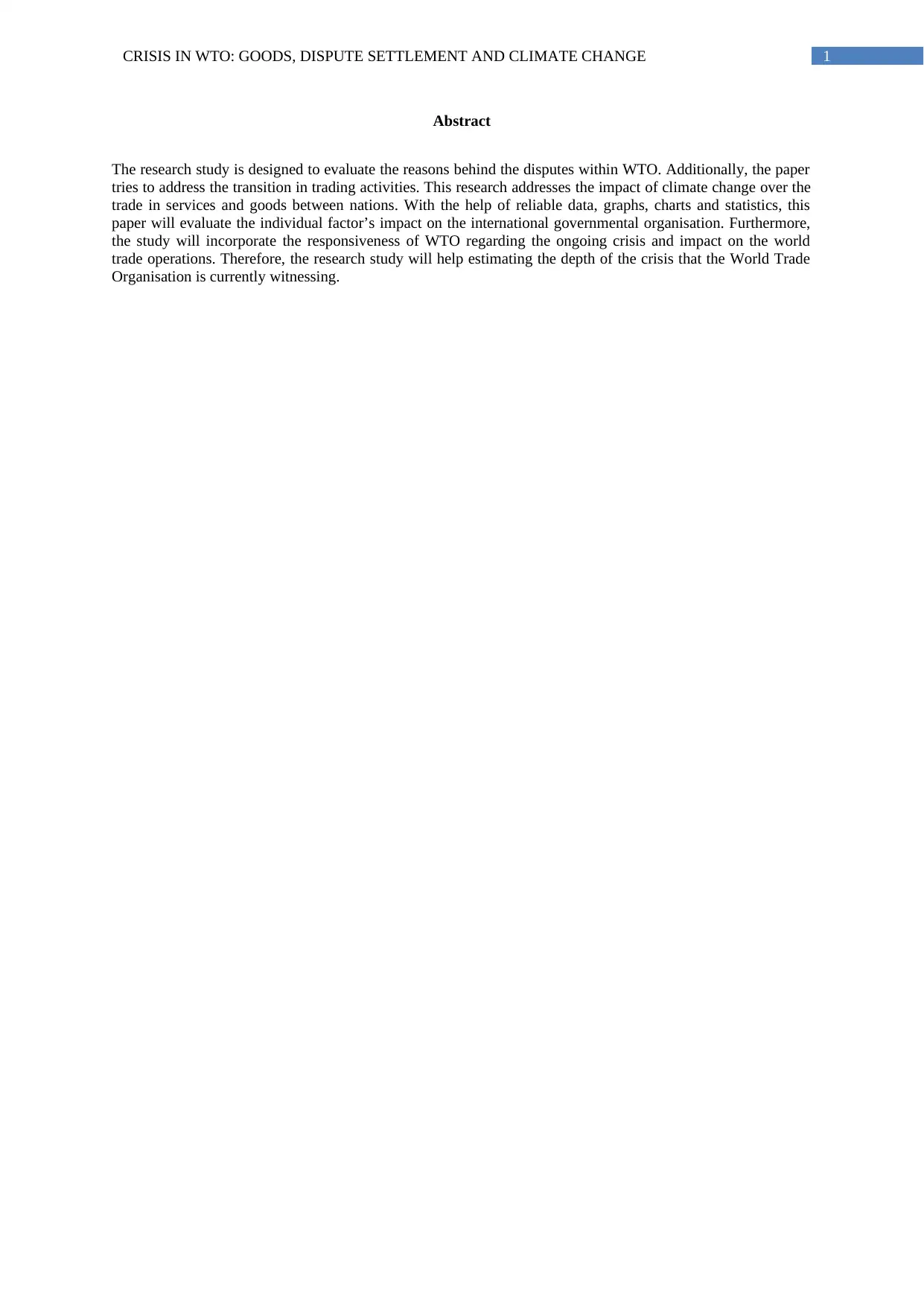
1CRISIS IN WTO: GOODS, DISPUTE SETTLEMENT AND CLIMATE CHANGE
Abstract
The research study is designed to evaluate the reasons behind the disputes within WTO. Additionally, the paper
tries to address the transition in trading activities. This research addresses the impact of climate change over the
trade in services and goods between nations. With the help of reliable data, graphs, charts and statistics, this
paper will evaluate the individual factor’s impact on the international governmental organisation. Furthermore,
the study will incorporate the responsiveness of WTO regarding the ongoing crisis and impact on the world
trade operations. Therefore, the research study will help estimating the depth of the crisis that the World Trade
Organisation is currently witnessing.
Abstract
The research study is designed to evaluate the reasons behind the disputes within WTO. Additionally, the paper
tries to address the transition in trading activities. This research addresses the impact of climate change over the
trade in services and goods between nations. With the help of reliable data, graphs, charts and statistics, this
paper will evaluate the individual factor’s impact on the international governmental organisation. Furthermore,
the study will incorporate the responsiveness of WTO regarding the ongoing crisis and impact on the world
trade operations. Therefore, the research study will help estimating the depth of the crisis that the World Trade
Organisation is currently witnessing.
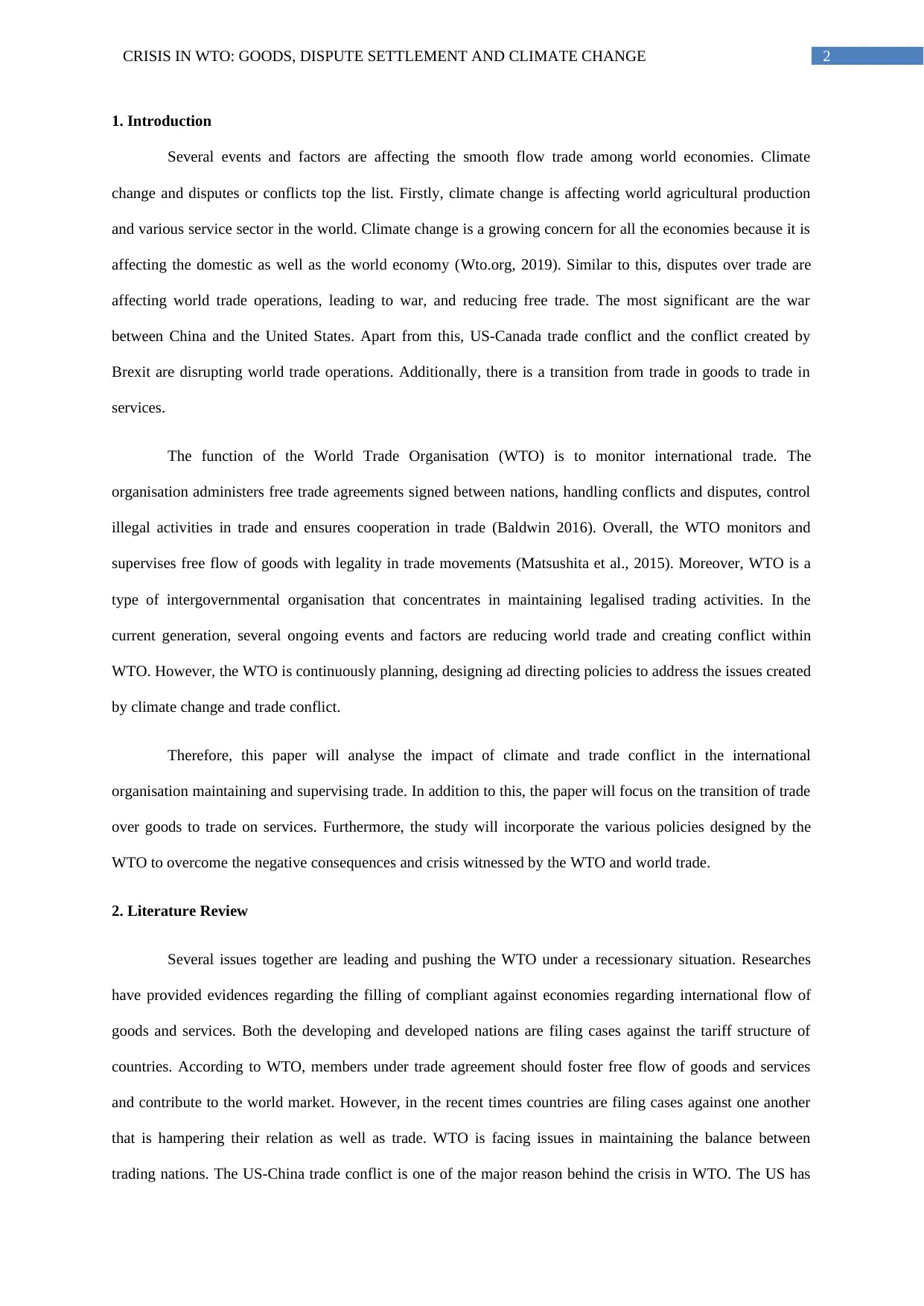
2CRISIS IN WTO: GOODS, DISPUTE SETTLEMENT AND CLIMATE CHANGE
1. Introduction
Several events and factors are affecting the smooth flow trade among world economies. Climate
change and disputes or conflicts top the list. Firstly, climate change is affecting world agricultural production
and various service sector in the world. Climate change is a growing concern for all the economies because it is
affecting the domestic as well as the world economy (Wto.org, 2019). Similar to this, disputes over trade are
affecting world trade operations, leading to war, and reducing free trade. The most significant are the war
between China and the United States. Apart from this, US-Canada trade conflict and the conflict created by
Brexit are disrupting world trade operations. Additionally, there is a transition from trade in goods to trade in
services.
The function of the World Trade Organisation (WTO) is to monitor international trade. The
organisation administers free trade agreements signed between nations, handling conflicts and disputes, control
illegal activities in trade and ensures cooperation in trade (Baldwin 2016). Overall, the WTO monitors and
supervises free flow of goods with legality in trade movements (Matsushita et al., 2015). Moreover, WTO is a
type of intergovernmental organisation that concentrates in maintaining legalised trading activities. In the
current generation, several ongoing events and factors are reducing world trade and creating conflict within
WTO. However, the WTO is continuously planning, designing ad directing policies to address the issues created
by climate change and trade conflict.
Therefore, this paper will analyse the impact of climate and trade conflict in the international
organisation maintaining and supervising trade. In addition to this, the paper will focus on the transition of trade
over goods to trade on services. Furthermore, the study will incorporate the various policies designed by the
WTO to overcome the negative consequences and crisis witnessed by the WTO and world trade.
2. Literature Review
Several issues together are leading and pushing the WTO under a recessionary situation. Researches
have provided evidences regarding the filling of compliant against economies regarding international flow of
goods and services. Both the developing and developed nations are filing cases against the tariff structure of
countries. According to WTO, members under trade agreement should foster free flow of goods and services
and contribute to the world market. However, in the recent times countries are filing cases against one another
that is hampering their relation as well as trade. WTO is facing issues in maintaining the balance between
trading nations. The US-China trade conflict is one of the major reason behind the crisis in WTO. The US has
1. Introduction
Several events and factors are affecting the smooth flow trade among world economies. Climate
change and disputes or conflicts top the list. Firstly, climate change is affecting world agricultural production
and various service sector in the world. Climate change is a growing concern for all the economies because it is
affecting the domestic as well as the world economy (Wto.org, 2019). Similar to this, disputes over trade are
affecting world trade operations, leading to war, and reducing free trade. The most significant are the war
between China and the United States. Apart from this, US-Canada trade conflict and the conflict created by
Brexit are disrupting world trade operations. Additionally, there is a transition from trade in goods to trade in
services.
The function of the World Trade Organisation (WTO) is to monitor international trade. The
organisation administers free trade agreements signed between nations, handling conflicts and disputes, control
illegal activities in trade and ensures cooperation in trade (Baldwin 2016). Overall, the WTO monitors and
supervises free flow of goods with legality in trade movements (Matsushita et al., 2015). Moreover, WTO is a
type of intergovernmental organisation that concentrates in maintaining legalised trading activities. In the
current generation, several ongoing events and factors are reducing world trade and creating conflict within
WTO. However, the WTO is continuously planning, designing ad directing policies to address the issues created
by climate change and trade conflict.
Therefore, this paper will analyse the impact of climate and trade conflict in the international
organisation maintaining and supervising trade. In addition to this, the paper will focus on the transition of trade
over goods to trade on services. Furthermore, the study will incorporate the various policies designed by the
WTO to overcome the negative consequences and crisis witnessed by the WTO and world trade.
2. Literature Review
Several issues together are leading and pushing the WTO under a recessionary situation. Researches
have provided evidences regarding the filling of compliant against economies regarding international flow of
goods and services. Both the developing and developed nations are filing cases against the tariff structure of
countries. According to WTO, members under trade agreement should foster free flow of goods and services
and contribute to the world market. However, in the recent times countries are filing cases against one another
that is hampering their relation as well as trade. WTO is facing issues in maintaining the balance between
trading nations. The US-China trade conflict is one of the major reason behind the crisis in WTO. The US has
⊘ This is a preview!⊘
Do you want full access?
Subscribe today to unlock all pages.

Trusted by 1+ million students worldwide
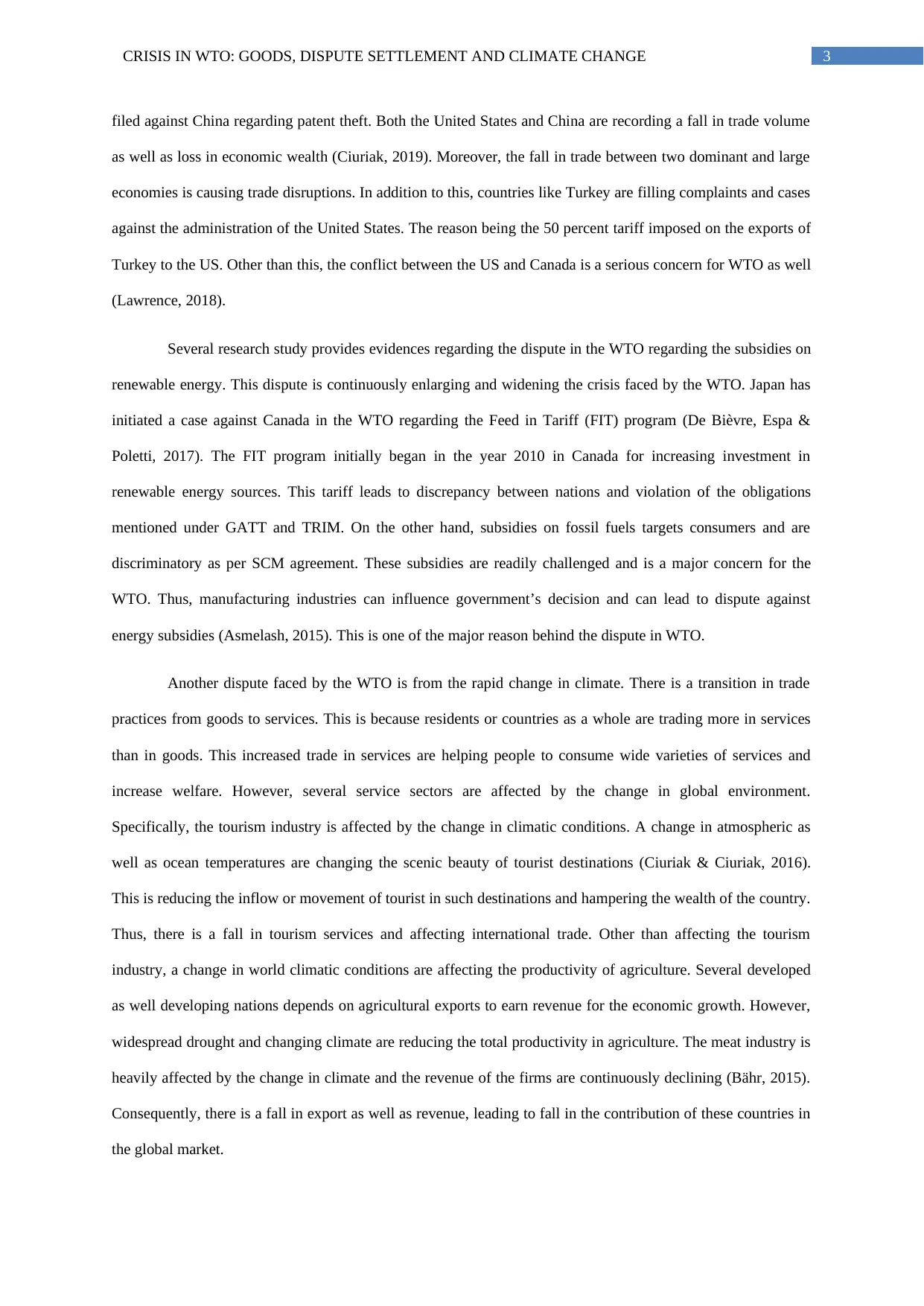
3CRISIS IN WTO: GOODS, DISPUTE SETTLEMENT AND CLIMATE CHANGE
filed against China regarding patent theft. Both the United States and China are recording a fall in trade volume
as well as loss in economic wealth (Ciuriak, 2019). Moreover, the fall in trade between two dominant and large
economies is causing trade disruptions. In addition to this, countries like Turkey are filling complaints and cases
against the administration of the United States. The reason being the 50 percent tariff imposed on the exports of
Turkey to the US. Other than this, the conflict between the US and Canada is a serious concern for WTO as well
(Lawrence, 2018).
Several research study provides evidences regarding the dispute in the WTO regarding the subsidies on
renewable energy. This dispute is continuously enlarging and widening the crisis faced by the WTO. Japan has
initiated a case against Canada in the WTO regarding the Feed in Tariff (FIT) program (De Bièvre, Espa &
Poletti, 2017). The FIT program initially began in the year 2010 in Canada for increasing investment in
renewable energy sources. This tariff leads to discrepancy between nations and violation of the obligations
mentioned under GATT and TRIM. On the other hand, subsidies on fossil fuels targets consumers and are
discriminatory as per SCM agreement. These subsidies are readily challenged and is a major concern for the
WTO. Thus, manufacturing industries can influence government’s decision and can lead to dispute against
energy subsidies (Asmelash, 2015). This is one of the major reason behind the dispute in WTO.
Another dispute faced by the WTO is from the rapid change in climate. There is a transition in trade
practices from goods to services. This is because residents or countries as a whole are trading more in services
than in goods. This increased trade in services are helping people to consume wide varieties of services and
increase welfare. However, several service sectors are affected by the change in global environment.
Specifically, the tourism industry is affected by the change in climatic conditions. A change in atmospheric as
well as ocean temperatures are changing the scenic beauty of tourist destinations (Ciuriak & Ciuriak, 2016).
This is reducing the inflow or movement of tourist in such destinations and hampering the wealth of the country.
Thus, there is a fall in tourism services and affecting international trade. Other than affecting the tourism
industry, a change in world climatic conditions are affecting the productivity of agriculture. Several developed
as well developing nations depends on agricultural exports to earn revenue for the economic growth. However,
widespread drought and changing climate are reducing the total productivity in agriculture. The meat industry is
heavily affected by the change in climate and the revenue of the firms are continuously declining (Bähr, 2015).
Consequently, there is a fall in export as well as revenue, leading to fall in the contribution of these countries in
the global market.
filed against China regarding patent theft. Both the United States and China are recording a fall in trade volume
as well as loss in economic wealth (Ciuriak, 2019). Moreover, the fall in trade between two dominant and large
economies is causing trade disruptions. In addition to this, countries like Turkey are filling complaints and cases
against the administration of the United States. The reason being the 50 percent tariff imposed on the exports of
Turkey to the US. Other than this, the conflict between the US and Canada is a serious concern for WTO as well
(Lawrence, 2018).
Several research study provides evidences regarding the dispute in the WTO regarding the subsidies on
renewable energy. This dispute is continuously enlarging and widening the crisis faced by the WTO. Japan has
initiated a case against Canada in the WTO regarding the Feed in Tariff (FIT) program (De Bièvre, Espa &
Poletti, 2017). The FIT program initially began in the year 2010 in Canada for increasing investment in
renewable energy sources. This tariff leads to discrepancy between nations and violation of the obligations
mentioned under GATT and TRIM. On the other hand, subsidies on fossil fuels targets consumers and are
discriminatory as per SCM agreement. These subsidies are readily challenged and is a major concern for the
WTO. Thus, manufacturing industries can influence government’s decision and can lead to dispute against
energy subsidies (Asmelash, 2015). This is one of the major reason behind the dispute in WTO.
Another dispute faced by the WTO is from the rapid change in climate. There is a transition in trade
practices from goods to services. This is because residents or countries as a whole are trading more in services
than in goods. This increased trade in services are helping people to consume wide varieties of services and
increase welfare. However, several service sectors are affected by the change in global environment.
Specifically, the tourism industry is affected by the change in climatic conditions. A change in atmospheric as
well as ocean temperatures are changing the scenic beauty of tourist destinations (Ciuriak & Ciuriak, 2016).
This is reducing the inflow or movement of tourist in such destinations and hampering the wealth of the country.
Thus, there is a fall in tourism services and affecting international trade. Other than affecting the tourism
industry, a change in world climatic conditions are affecting the productivity of agriculture. Several developed
as well developing nations depends on agricultural exports to earn revenue for the economic growth. However,
widespread drought and changing climate are reducing the total productivity in agriculture. The meat industry is
heavily affected by the change in climate and the revenue of the firms are continuously declining (Bähr, 2015).
Consequently, there is a fall in export as well as revenue, leading to fall in the contribution of these countries in
the global market.
Paraphrase This Document
Need a fresh take? Get an instant paraphrase of this document with our AI Paraphraser
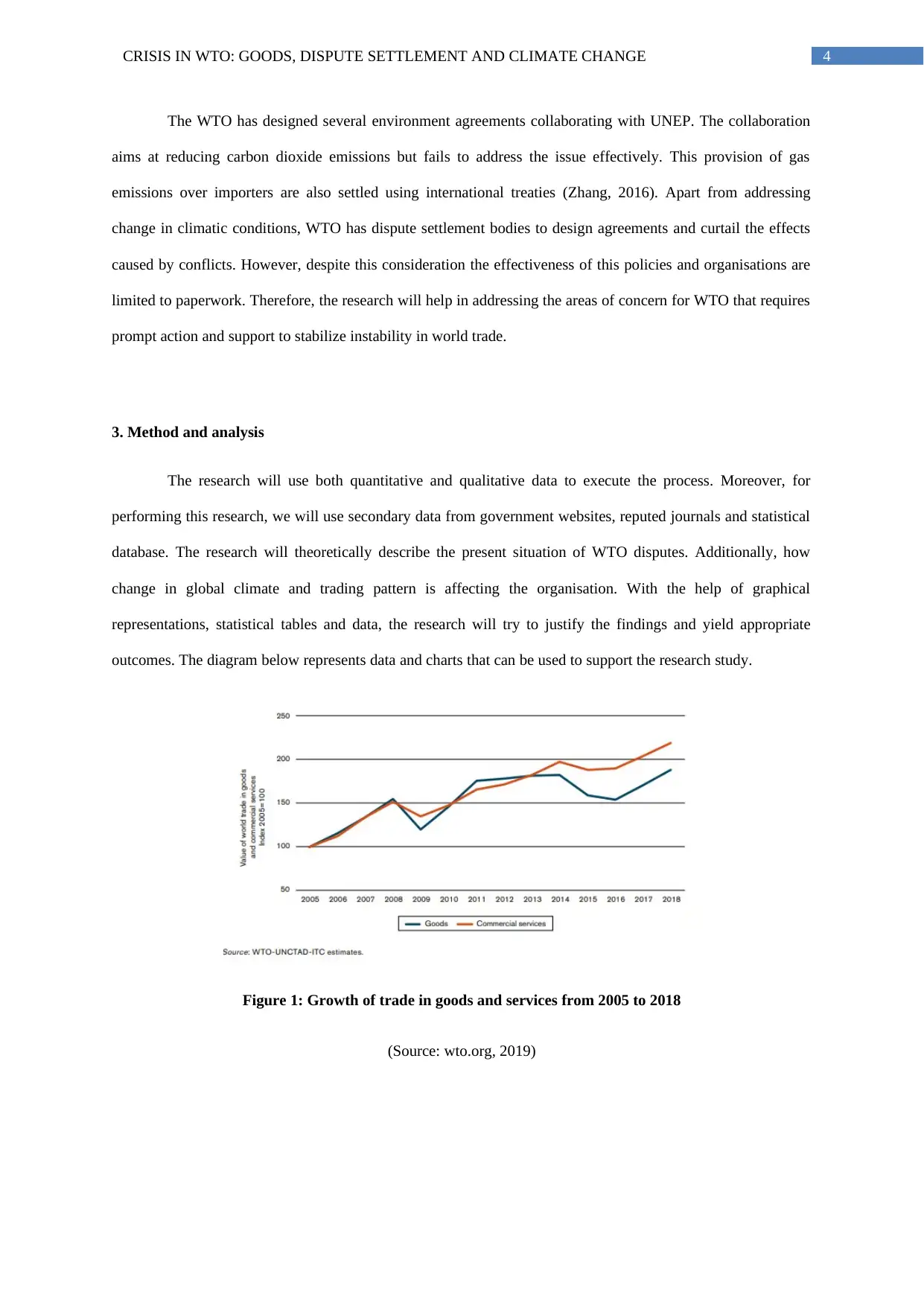
4CRISIS IN WTO: GOODS, DISPUTE SETTLEMENT AND CLIMATE CHANGE
The WTO has designed several environment agreements collaborating with UNEP. The collaboration
aims at reducing carbon dioxide emissions but fails to address the issue effectively. This provision of gas
emissions over importers are also settled using international treaties (Zhang, 2016). Apart from addressing
change in climatic conditions, WTO has dispute settlement bodies to design agreements and curtail the effects
caused by conflicts. However, despite this consideration the effectiveness of this policies and organisations are
limited to paperwork. Therefore, the research will help in addressing the areas of concern for WTO that requires
prompt action and support to stabilize instability in world trade.
3. Method and analysis
The research will use both quantitative and qualitative data to execute the process. Moreover, for
performing this research, we will use secondary data from government websites, reputed journals and statistical
database. The research will theoretically describe the present situation of WTO disputes. Additionally, how
change in global climate and trading pattern is affecting the organisation. With the help of graphical
representations, statistical tables and data, the research will try to justify the findings and yield appropriate
outcomes. The diagram below represents data and charts that can be used to support the research study.
Figure 1: Growth of trade in goods and services from 2005 to 2018
(Source: wto.org, 2019)
The WTO has designed several environment agreements collaborating with UNEP. The collaboration
aims at reducing carbon dioxide emissions but fails to address the issue effectively. This provision of gas
emissions over importers are also settled using international treaties (Zhang, 2016). Apart from addressing
change in climatic conditions, WTO has dispute settlement bodies to design agreements and curtail the effects
caused by conflicts. However, despite this consideration the effectiveness of this policies and organisations are
limited to paperwork. Therefore, the research will help in addressing the areas of concern for WTO that requires
prompt action and support to stabilize instability in world trade.
3. Method and analysis
The research will use both quantitative and qualitative data to execute the process. Moreover, for
performing this research, we will use secondary data from government websites, reputed journals and statistical
database. The research will theoretically describe the present situation of WTO disputes. Additionally, how
change in global climate and trading pattern is affecting the organisation. With the help of graphical
representations, statistical tables and data, the research will try to justify the findings and yield appropriate
outcomes. The diagram below represents data and charts that can be used to support the research study.
Figure 1: Growth of trade in goods and services from 2005 to 2018
(Source: wto.org, 2019)
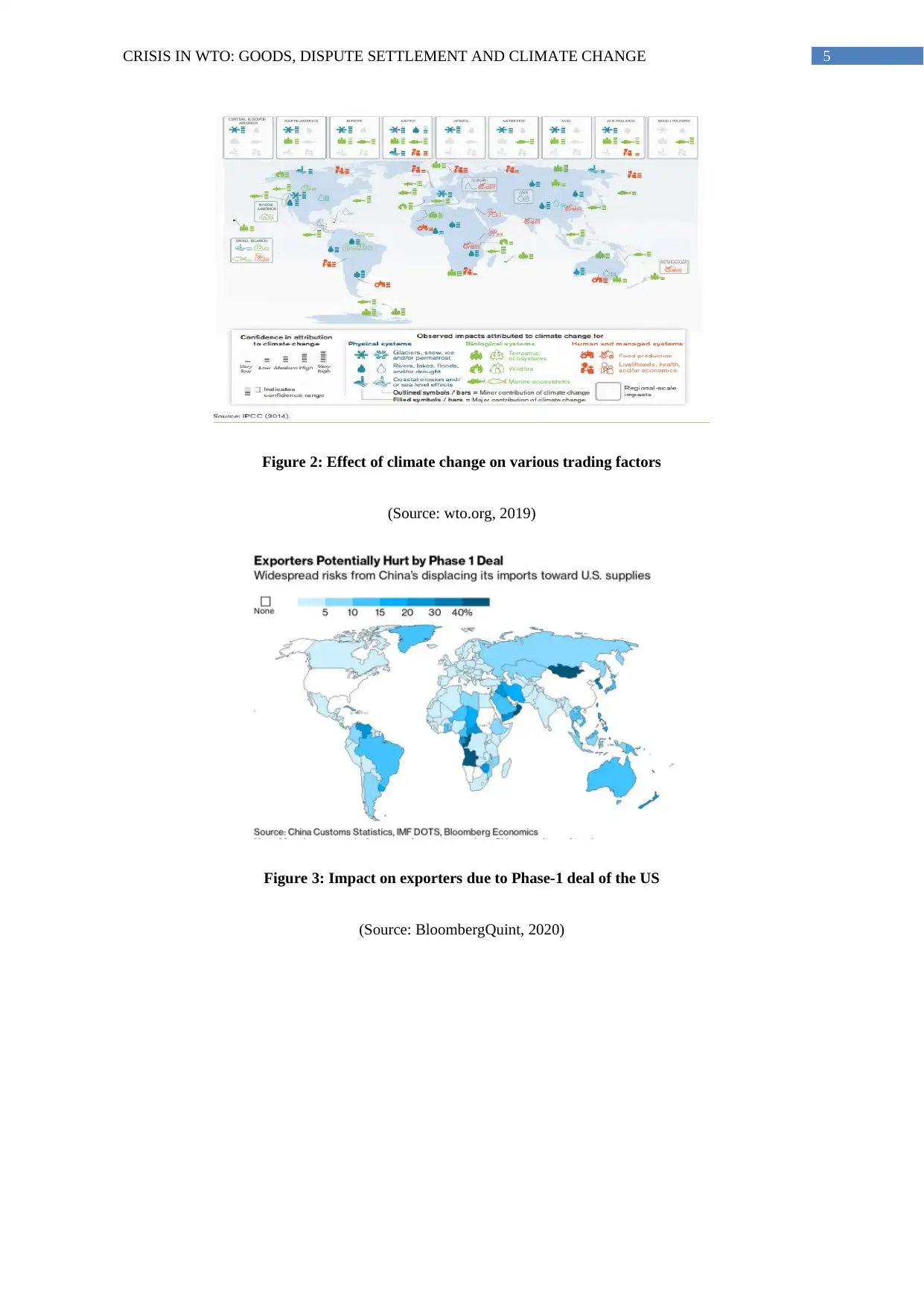
5CRISIS IN WTO: GOODS, DISPUTE SETTLEMENT AND CLIMATE CHANGE
Figure 2: Effect of climate change on various trading factors
(Source: wto.org, 2019)
Figure 3: Impact on exporters due to Phase-1 deal of the US
(Source: BloombergQuint, 2020)
Figure 2: Effect of climate change on various trading factors
(Source: wto.org, 2019)
Figure 3: Impact on exporters due to Phase-1 deal of the US
(Source: BloombergQuint, 2020)
⊘ This is a preview!⊘
Do you want full access?
Subscribe today to unlock all pages.

Trusted by 1+ million students worldwide
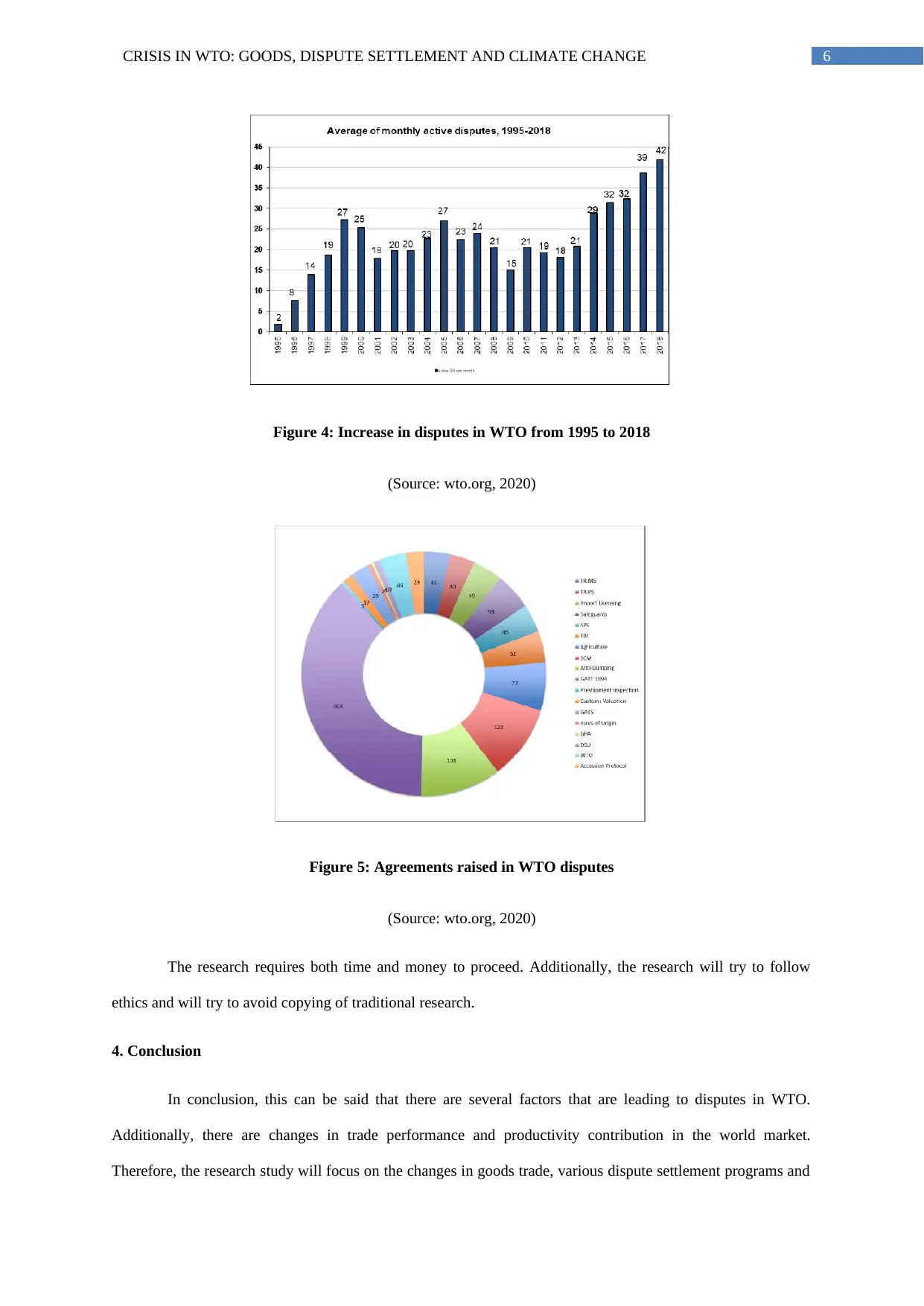
6CRISIS IN WTO: GOODS, DISPUTE SETTLEMENT AND CLIMATE CHANGE
Figure 4: Increase in disputes in WTO from 1995 to 2018
(Source: wto.org, 2020)
Figure 5: Agreements raised in WTO disputes
(Source: wto.org, 2020)
The research requires both time and money to proceed. Additionally, the research will try to follow
ethics and will try to avoid copying of traditional research.
4. Conclusion
In conclusion, this can be said that there are several factors that are leading to disputes in WTO.
Additionally, there are changes in trade performance and productivity contribution in the world market.
Therefore, the research study will focus on the changes in goods trade, various dispute settlement programs and
Figure 4: Increase in disputes in WTO from 1995 to 2018
(Source: wto.org, 2020)
Figure 5: Agreements raised in WTO disputes
(Source: wto.org, 2020)
The research requires both time and money to proceed. Additionally, the research will try to follow
ethics and will try to avoid copying of traditional research.
4. Conclusion
In conclusion, this can be said that there are several factors that are leading to disputes in WTO.
Additionally, there are changes in trade performance and productivity contribution in the world market.
Therefore, the research study will focus on the changes in goods trade, various dispute settlement programs and
Paraphrase This Document
Need a fresh take? Get an instant paraphrase of this document with our AI Paraphraser
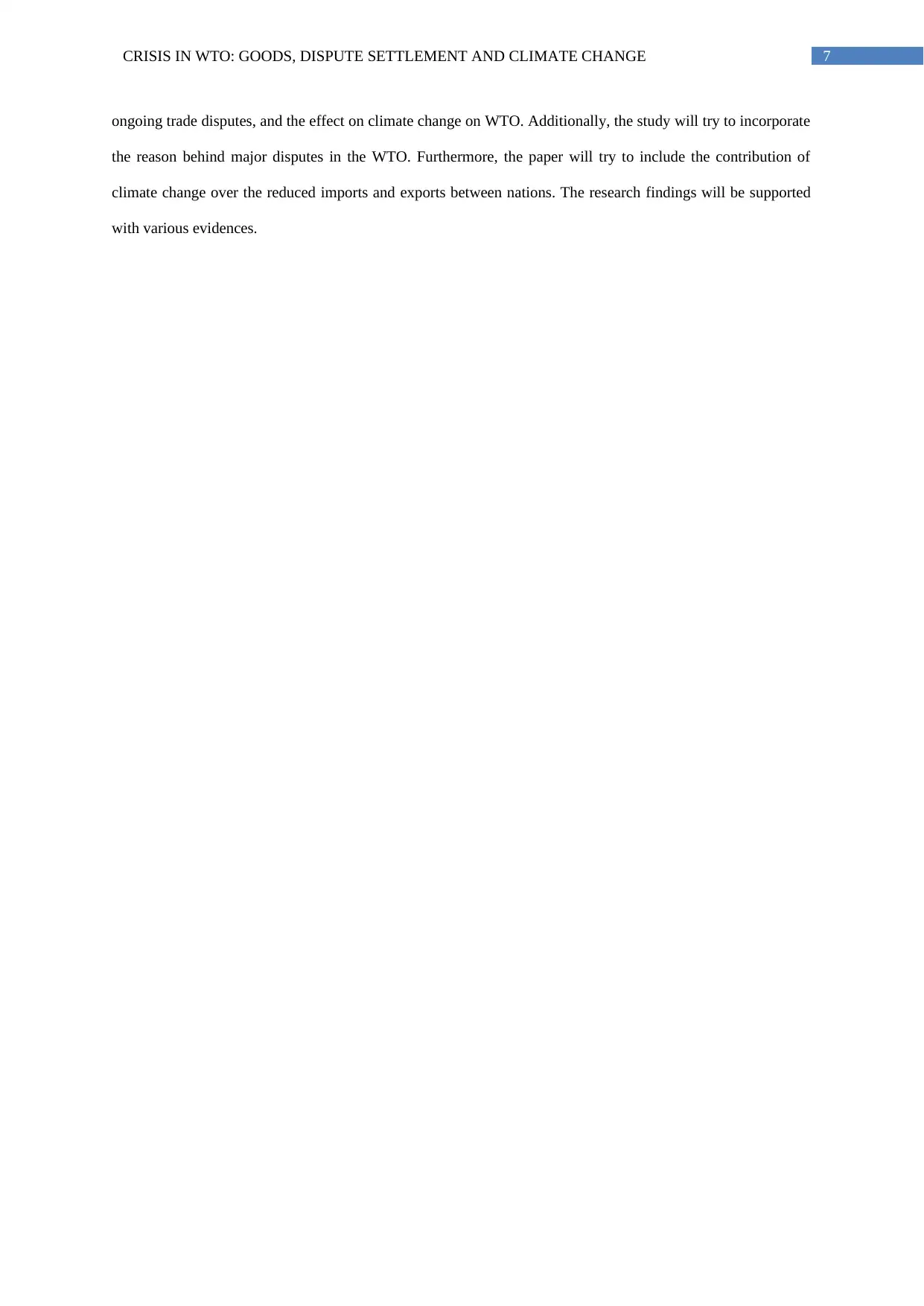
7CRISIS IN WTO: GOODS, DISPUTE SETTLEMENT AND CLIMATE CHANGE
ongoing trade disputes, and the effect on climate change on WTO. Additionally, the study will try to incorporate
the reason behind major disputes in the WTO. Furthermore, the paper will try to include the contribution of
climate change over the reduced imports and exports between nations. The research findings will be supported
with various evidences.
ongoing trade disputes, and the effect on climate change on WTO. Additionally, the study will try to incorporate
the reason behind major disputes in the WTO. Furthermore, the paper will try to include the contribution of
climate change over the reduced imports and exports between nations. The research findings will be supported
with various evidences.
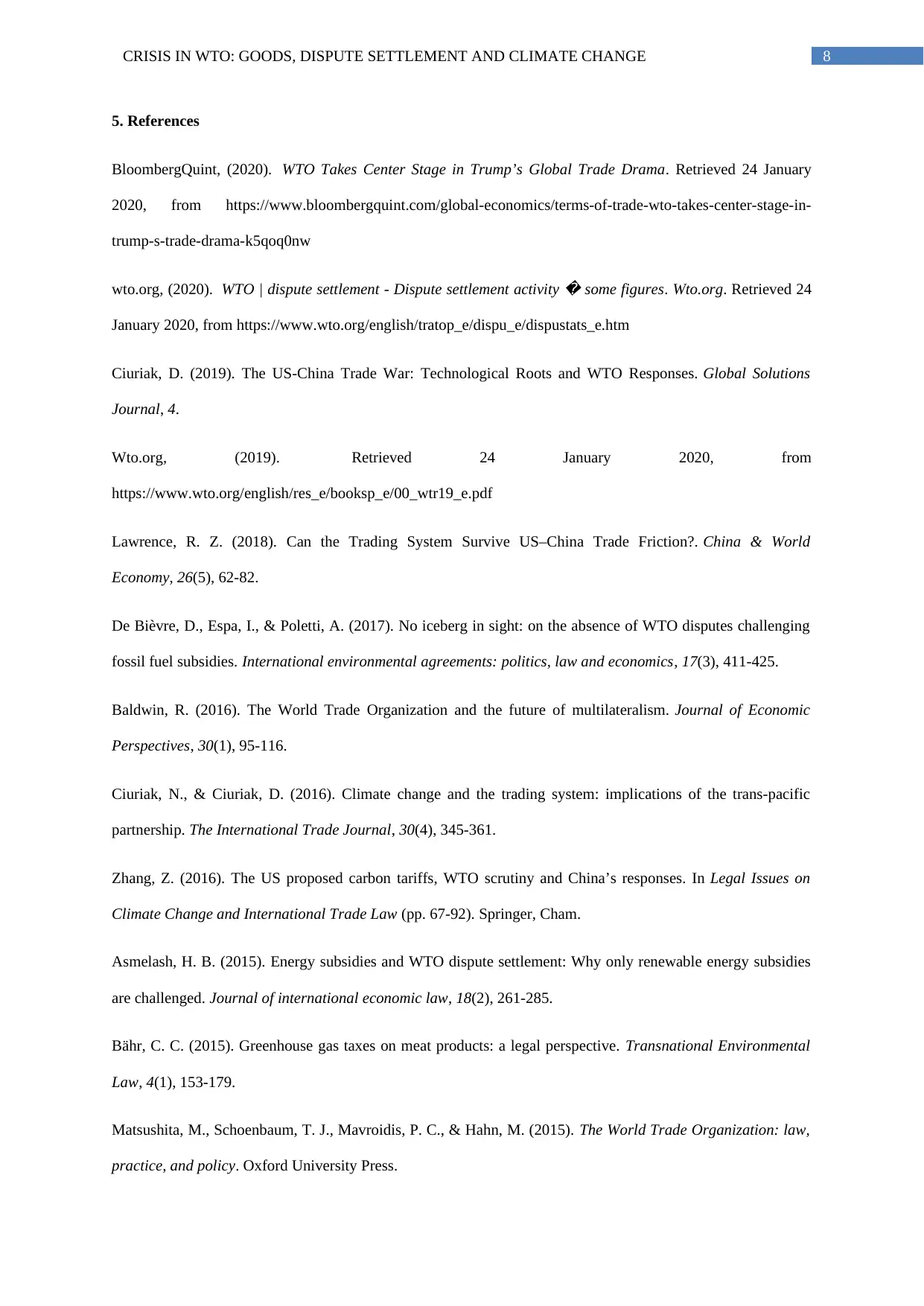
8CRISIS IN WTO: GOODS, DISPUTE SETTLEMENT AND CLIMATE CHANGE
5. References
BloombergQuint, (2020). WTO Takes Center Stage in Trump’s Global Trade Drama. Retrieved 24 January
2020, from https://www.bloombergquint.com/global-economics/terms-of-trade-wto-takes-center-stage-in-
trump-s-trade-drama-k5qoq0nw
wto.org, (2020). WTO | dispute settlement - Dispute settlement activity � some figures. Wto.org. Retrieved 24
January 2020, from https://www.wto.org/english/tratop_e/dispu_e/dispustats_e.htm
Ciuriak, D. (2019). The US-China Trade War: Technological Roots and WTO Responses. Global Solutions
Journal, 4.
Wto.org, (2019). Retrieved 24 January 2020, from
https://www.wto.org/english/res_e/booksp_e/00_wtr19_e.pdf
Lawrence, R. Z. (2018). Can the Trading System Survive US–China Trade Friction?. China & World
Economy, 26(5), 62-82.
De Bièvre, D., Espa, I., & Poletti, A. (2017). No iceberg in sight: on the absence of WTO disputes challenging
fossil fuel subsidies. International environmental agreements: politics, law and economics, 17(3), 411-425.
Baldwin, R. (2016). The World Trade Organization and the future of multilateralism. Journal of Economic
Perspectives, 30(1), 95-116.
Ciuriak, N., & Ciuriak, D. (2016). Climate change and the trading system: implications of the trans-pacific
partnership. The International Trade Journal, 30(4), 345-361.
Zhang, Z. (2016). The US proposed carbon tariffs, WTO scrutiny and China’s responses. In Legal Issues on
Climate Change and International Trade Law (pp. 67-92). Springer, Cham.
Asmelash, H. B. (2015). Energy subsidies and WTO dispute settlement: Why only renewable energy subsidies
are challenged. Journal of international economic law, 18(2), 261-285.
Bähr, C. C. (2015). Greenhouse gas taxes on meat products: a legal perspective. Transnational Environmental
Law, 4(1), 153-179.
Matsushita, M., Schoenbaum, T. J., Mavroidis, P. C., & Hahn, M. (2015). The World Trade Organization: law,
practice, and policy. Oxford University Press.
5. References
BloombergQuint, (2020). WTO Takes Center Stage in Trump’s Global Trade Drama. Retrieved 24 January
2020, from https://www.bloombergquint.com/global-economics/terms-of-trade-wto-takes-center-stage-in-
trump-s-trade-drama-k5qoq0nw
wto.org, (2020). WTO | dispute settlement - Dispute settlement activity � some figures. Wto.org. Retrieved 24
January 2020, from https://www.wto.org/english/tratop_e/dispu_e/dispustats_e.htm
Ciuriak, D. (2019). The US-China Trade War: Technological Roots and WTO Responses. Global Solutions
Journal, 4.
Wto.org, (2019). Retrieved 24 January 2020, from
https://www.wto.org/english/res_e/booksp_e/00_wtr19_e.pdf
Lawrence, R. Z. (2018). Can the Trading System Survive US–China Trade Friction?. China & World
Economy, 26(5), 62-82.
De Bièvre, D., Espa, I., & Poletti, A. (2017). No iceberg in sight: on the absence of WTO disputes challenging
fossil fuel subsidies. International environmental agreements: politics, law and economics, 17(3), 411-425.
Baldwin, R. (2016). The World Trade Organization and the future of multilateralism. Journal of Economic
Perspectives, 30(1), 95-116.
Ciuriak, N., & Ciuriak, D. (2016). Climate change and the trading system: implications of the trans-pacific
partnership. The International Trade Journal, 30(4), 345-361.
Zhang, Z. (2016). The US proposed carbon tariffs, WTO scrutiny and China’s responses. In Legal Issues on
Climate Change and International Trade Law (pp. 67-92). Springer, Cham.
Asmelash, H. B. (2015). Energy subsidies and WTO dispute settlement: Why only renewable energy subsidies
are challenged. Journal of international economic law, 18(2), 261-285.
Bähr, C. C. (2015). Greenhouse gas taxes on meat products: a legal perspective. Transnational Environmental
Law, 4(1), 153-179.
Matsushita, M., Schoenbaum, T. J., Mavroidis, P. C., & Hahn, M. (2015). The World Trade Organization: law,
practice, and policy. Oxford University Press.
⊘ This is a preview!⊘
Do you want full access?
Subscribe today to unlock all pages.

Trusted by 1+ million students worldwide

9CRISIS IN WTO: GOODS, DISPUTE SETTLEMENT AND CLIMATE CHANGE
1 out of 10
Related Documents
Your All-in-One AI-Powered Toolkit for Academic Success.
+13062052269
info@desklib.com
Available 24*7 on WhatsApp / Email
![[object Object]](/_next/static/media/star-bottom.7253800d.svg)
Unlock your academic potential
Copyright © 2020–2026 A2Z Services. All Rights Reserved. Developed and managed by ZUCOL.




